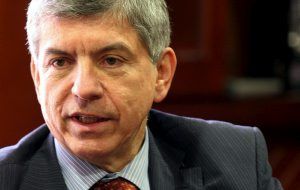MercoPress. South Atlantic News Agency
Zelaya’s return “Impossible”: no support from Congress, Justice or the military
 Former OAS Secretary General Gaviria is not sure about Zelaya return to office
Former OAS Secretary General Gaviria is not sure about Zelaya return to office Former Secretary General from the Organization of American States, (OAS), Cesar Gaviria said it was “impossible” for ousted Honduran President Manuel Zelaya to be reinstated since he lacks the support from the Supreme Court, Congress and the military
Gaviria favours a transition government and a close monitoring process of the coming presidential elections as a pragmatic way out of the ongoing institutional crisis.
“It’s impossible to bring Zelaya back to the presidency, since the Supreme Court, Congress and the military do not support him” said Gaviria during his participation at the “Brazil summit” seminar organized by The Economist in Sao Paulo.
“I don’t like to talk about OAS issues, it’s very difficult, but what we must try and achieve is a transition government and an international process to monitor and check on the elections”, said Gaviria.
“Obviously it’s up to the Foreign offices and the different countries help find a solution to the Honduran crisis, but at this stage what is viable is a transition government that manages a credible electoral process”.
Gaviria who was OAS Secretary General from 1994 to 2004 also made comments on the OAS resolution on Honduras and the international mediation that followed the ousting of president Zelaya last June 28th and his return to Tegucigalpa on September 21st where he has remained holed in at the Brazilian embassy.
“I believe that there should have been some criticisms to some of the excesses committed by Zelaya while he was president and which triggered problems with the Supreme Court, with Congress and with the Armed Forces”, he underlined.
The Judiciary has decided to open a file on Zelaya for his alleged violation of the Constitution on trying to call a popular vote with the purpose of reforming the chart which specifically bans any attempts to favour or impose a presidential re-election.
According to Gaviria the OAS resolution “should have been more balanced; this would have given the inter-American system more authority to mediate in the Honduras crisis”.
From Honduras, Zelaya said that the OAS should establish a “timetable” for dialogue between him and the de facto government of Roberto Micheletti.
“The OAS position is correct, but it must give a more determined, specific time” for the conclusion of the current dialogue. Negotiations are currently stalled and OAS has called on both sides for an effort to keep advancing with the talks.
According to the Honduras political calendar presidential elections should be held at the end of November.
Meanwhile United States warned it will increase pressure on the de facto regime for the dialogue to advance, according to US Ambassador before OAS Lewis Amselem.
“The time has come for both sides to leave aside their egos and put the interests of the Honduran people top of the agenda”, said Amselem in Washington.
“Negotiations are not to make time; the US will continue to put pressure on the main officials from the Honduras regime”, if Micheletti does not act more seriously.
“The de facto regime has not shown to be as flexible or favourable to a compromise as President Zelaya”, underlined the US ambassador.
The US has cancelled the visas of most top officials from the de facto government and cut off several aid programs.




Top Comments
Disclaimer & comment rulesCommenting for this story is now closed.
If you have a Facebook account, become a fan and comment on our Facebook Page!